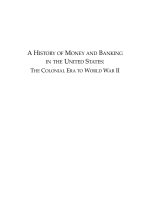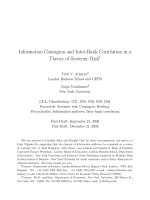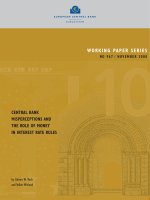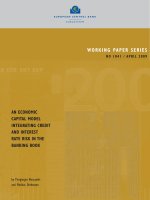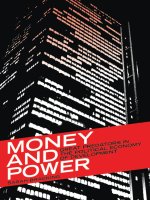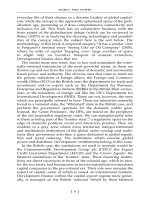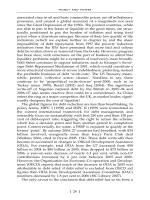Islamic money and banking integrating money in capital theory
Bạn đang xem bản rút gọn của tài liệu. Xem và tải ngay bản đầy đủ của tài liệu tại đây (3.1 MB, 411 trang )
www.ebook3000.com
Islamic Money and Banking
Integrating Money in Capital Theory
www.ebook3000.com
Islamic Money and Banking
Integrating Money in Capital Theory
Dr. Iraj Toutounchian
John Wiley & Sons (Asia) Pte. Ltd.
www.ebook3000.com
Copyright © 2009 John Wiley & Sons (Asia) Pte. Ltd.
Published in 2009 by John Wiley & Sons (Asia) Pte. Ltd.
2 Clementi Loop, #02-01, Singapore 129809
All rights reserved.
No part of this publication may be reproduced, stored in a retrieval system, or
transmitted in any form or by any means, electronic, mechanical, photocopying,
recording, scanning, or otherwise, except as expressly permitted by law, without
either the prior written permission of the Publisher, or authorization through
payment of the appropriate photocopy fee to the Copyright Clearance Center.
Requests for permission should be addressed to the Publisher, John Wiley & Sons
(Asia) Pte. Ltd., 2 Clementi Loop, #02-01, Singapore 129809, tel: 65-6463-2400,
fax: 65-6463-4605, e-mail:
This publication is designed to provide accurate and authoritative information in
regard to the subject matter covered. It is sold with the understanding that the
publisher is not engaged in rendering professional services. If professional advice
or other expert assistance is required, the services of a competent professional
person should be sought.
Neither the authors nor the publisher are liable for any actions prompted or caused
by the information presented in this book. Any views expressed herein are those
of the authors and do not represent the views of the organizations they work for.
Other Wiley Editorial Offices
John Wiley & Sons, 111 River Street, Hoboken, NJ 07030, USA
John Wiley & Sons, The Atrium, Southern Gate, Chichester, West Sussex, P019
8SQ, United Kingdom
John Wiley & Sons (Canada) Ltd., 5353 Dundas Street West, Suite 400, Toronto,
Ontario, M9B 6HB, Canada
John Wiley & Sons Australia Ltd, 42 McDougall Street, Milton, Queensland 4064,
Australia
Wiley-VCH, Boschstrasse 12, D-69469 Weinheim, Germany
Library of Congress Cataloging-in-Publication Data:
ISBN
978-0-470-82319-4
Typeset in 10.5/13pt Sabon by Laserwords Private Limited, Chennai, India.
Printed in Singapore by Saik Wah Press Pte. Ltd.
10 9 8 7 6 5 4 3 2 1
In the name of Allah, the Compassionate, the Merciful
www.ebook3000.com
Contents
Acknowledgments
ix
Preface
xi
1 An Evaluation of Money: A New Perspective
Commodity Money
1
1
Metallic Money
4
Dinar and Dirham (D-D)
7
What is (Paper) Money?
10
An Impure Public Good
14
Quantity Theory of Money and a Country’s Balance Sheet
22
Functions of Money in an Islamic Setting
28
The General Theory as Monetary Theory
34
Cooperation in Islam
51
A Just Voting System
56
Islamic Foundation of Norms for Cooperation
58
Equivalence between Functions of and Demand for Money
65
Notes
85
2 Interest on Money and Its Scope
89
A Brief History of Interest
89
The Place of Interest in Capitalist Economics
93
The Place of Labor
101
Western Justifications for Interest
111
Time Preference and its Relation to the Rate of Interest
118
Is Time Preference Positive in all Circumstances?
129
Some Further Thoughts on Interest
135
Exchange Cost, Seigniorage and Inflation
147
The Socially Optimal Provision of Money in the Capitalist System
150
Interest (Riba) in Islam
151
Notes
160
3 A Legal Perspective on Islamic Finance
163
Capital Theory: A Brief Recapitulation
163
The Legalities of Money and Capital
179
Money and Capital Reconsidered
182
Supply of Money Unidentified
190
Extended Model
193
vii
www.ebook3000.com
viii
Contents
Implications of the Model
197
Notes
200
4 Interest: Fact and Fiction
The Place of Man in the Economic System
201
208
The Evils of Interest
215
Notes
225
5 Islamic Banking versus Conventional Banking
The Structure and Functions of Banking
227
227
Underlying Conditions for Success in Islamic Finance
240
The Philosophical Foundations of the Place and the Ultimate Goal of Man
252
Islamic Modes of Finance
260
Islamic Bank Structure
263
Islamic Contracts
270
New Products
287
Notes
293
6 The Role of Conventional and Islamic Banks in Investment:
Certainty and Risk Conditions
Introduction
299
299
Investment in a Capitalist Economy
302
Investment Expenditure: A Function of Interest Rate?
304
Investment in an Islamic Economy
307
Portfolio Management for Households
315
Notes
317
7 The Role of Central Banks in Islamic Banking
Revising Roles: Learning from Experience
319
319
Revisions (Beyond Amendments)
325
The Role of the Central Bank in Islamic Banking
333
Assertions
334
Classification of Islamic Modes of Contract
337
Application of IRR and Zero Cost of Capital
339
The Transmission Mechanism for Creating Money
346
Notes
349
Bibliography
351
Index
369
Acknowledgments
My greatest intellectual debt in the preparation of this book goes
back many years to my undergraduate and graduate years, when
some of my instructors had the greatest impact in shaping my ideas.
My special thanks are extended to Professor M. Agah of Tehran
University; my Ph.D. dissertation supervisor Professor A. S. DeVany;
Professor T. Saving; and Professor R. L. Basmann, all from Texas
A & M University.
It is hard for me to resist the temptation to dedicate this book to
my wife, Soussan Parsay, whose cooperation and support through
long years of my reading, thinking and writing, have greatly obviated
conflict and increased our family’s utility in many different ways.
Her responsibilities, both at the university and the hospital, hardly
interfered with those of the family circle. I have been blessed by Allah
(SWT) with a happy marriage and lovely children: Pouneh, Miladamir
and Amirhossein.
I am grateful for the valuable comments on the draft of the book
from the anonymous referee(s) assigned by the publishers.
A special word of thanks is owed to John Owen for his able
assistance in resolving the ambiguities arising from my writings during
his editing endeavor. He, to me, was more than just an editor; he also
improved the quality of my arguments throughout the manuscript.
Whatever errors may have crept in spite of the help I have received
are, of course, mine.
ix
www.ebook3000.com
Preface
The United States has established itself as the very symbol and
embodiment of capitalism. In examining its performance, we are able
to get an overall picture of what is happening elsewhere within the
broader capitalist community. Of the many great economic losses
experienced worldwide over the last hundred years, almost all have
had their origins in the United States. The current global crisis is no
exception. The 10 U.S. stock market crashes that have occurred over
this period have ranged from 71 days in 1929 to 999 days in the
period 2000–02. How long this current crisis will last is anybody’s
guess. Some economists believe that it is more severe than the Great
Depression of 1929–32 and may take even longer to resolve.
Given the incredible developments that have taken place in the
realm of the physical sciences in this time, it is surprising that no
comparable progress has been made in the economic sphere. The
advancement of knowledge is always expected to be on a rising
slope, not downward. Given an identical distribution of talent and
intelligence in both hard sciences and social sciences, the unequal
advances in these two branches of science can be used as evidence that
social science is more complex than physical science. This complexity
arises from the human element, which plays the central role in the
social sciences. Further, the evidence shows that marginal productivity
of research in economics has been declining; especially in that which
has been unduly blended with highly sophisticated mathematics, with
little or no operational benefit. This is evidenced by stock market
crashes, lopsided distribution of income and wealth, and global
economic turbulence, which have scarred the economic landscape of
the past century. The performance of this market has become the
most suitable barometer of the merits of capitalism and such have
been the catastrophic and all-embracing consequences of the current
crisis that many exponents of the system are now beginning to doubt
whether it can, or should, survive. Such doubts are only logical if
humanitarian considerations are to enter the equation. In the zero-sum
game of capitalism, someone’s gain is someone else’s loss. But, as will
become clear in the pages of this book, the global consequences of
capitalism have rarely found their way into the analyses of Western
economists.
xi
xii
Preface
The earliest and the most fundamental alert came from Frederick
Soddy and a few others thereafter, including Keynes in his General
Theory (although from a different perspective).
To look for an answer to the question raised above requires a
different look at the problem, and one which involves a much deeper
look at the fundamentals of capitalism. One such fundamental goes
back to the assumption of non-satiation, which in turn gives rise to
unchecked greed. Greed in a zero-sum game means to legally put
your hands on someone else’s wealth. Greed has always been with
mankind. Another basic principle of capitalism is self-interest, which
is in harmony with the philosophy of individualism. Non-satiation,
unchecked greed, and self-interest go hand in hand. If human nature
is simply the combination of these elements and nothing else, the
type of behavior commonly advocated and analyzed in capitalist textbooks has been a great success. However, Muslims—and, indeed,
many non-Muslims—have learned that human nature is much more
than a simple synthesis of these three characteristics. Emphasizing
these at the expense of human nature in its totality is dangerous, as
this book will show. Love, empathy, altruism, cooperation, sacrifice,
mutual concern, forgiveness, gratitude, virtue, benevolence and honesty are as much a part of human heritage as hatred, self-interest,
apathy, revenge, vice, dishonesty or fraud. Throughout history, there
has always been conflict between ‘‘good’’ and ‘‘bad’’ behavior, and
the people who embody these characteristics are either admired or
denounced according to the extent to which they make the world a
better place to live in. At this point, the crucial question we should be
examining is the role capitalism has played in this regard.
For Muslims, the ultimate source of religious belief is The Holy
Quran—the words of Allah (SWT)1 that benefit individuals, families and society at large.2 The happiness and sustainability of
society depend on there being a healthy and sustained economic
system, one that produces and promotes the positive side of human
behavior—individual and collective. The negative as well as the positive components of human nature are spelled out in the Quran. The
texts below highlight just a few of these:
Verily, man is given up to injustice and ingratitude. (Quran
14:34)
He (man) was indeed unjust and foolish. (Quran 33:72)
Most ungrateful is man. (Quran 17:67)
www.ebook3000.com
xiii
Preface
... man is given to hasty (deeds) (Quran 17:11)
Verily Man is in loss (Quran 103:2)
However, those who have faith in Allah (SWT) and obey his teachings are given ‘‘for sustenance things, good and pure; and... special
favors... ’’ (Quran 17:70). Indeed, Man has been created ‘‘in the best
of molds’’ (Quran 95:4), with the appropriate talents, strength, and
virtue to undertake his responsibilities as ‘‘a vicegerent on earth’’
(Quran 2:30).
The complexities of human nature required guidelines and restrictions set down by the Creator of the universe. But the lessons to be
learned from the Divine Laws go far beyond human nature. It is a
matter of order and regularity: as it has been observed for centuries in
the universe and the human body, so too should it be with socioeconomic affairs. Ignoring these rules and regulations has caused nations
serious problems that could have been avoided.
For example, at the center of the Islamic economic system is cooperation within and among cooperative firms. Without the voluntary
cooperative efforts of labor, maximum efficiency cannot be achieved.
The well-established conflict between efficiency and equity in the capitalistic zero-sum game will be removed where laborers have a stake
in the profits of the firm employing them. Cooperation which induces
labor to maximize effort will increase the size of the pie, transforming
the zero-sum game into an increasing-sum game and bringing new
sources of satisfaction without having to resort to war or taking away
material things from others.
As will become clear, Islamic banking is an integral part of a whole
called ‘‘Islamic economics’’ and thus must be in complete harmony
with the mother system to guarantee coherence and consistency. Any
dissimilarity between factors of the sub-system and its mother system is subject to failure, as capitalism has demonstrated on many
levels. For example, in consumer theory, students are taught that
interpersonal comparison of utilities is not permissible. In public
finance courses, however, they learn that taxing the rich and redistributing it among the poor allows just such a comparison to be
made. This is a case where value judgments in the realm of welfare economics come into play; something denounced in consumer
theory.
This does not imply, however, that without such an environment
Islamic banking will fail. Rather, its full potential will only materialize
if it takes a wider view. Neither does it imply that Islamic banking is
xiv
Preface
capable of implementation solely in the Muslim world. The message
of Islam is universal. As long as the financial contracts are designed to
incorporate Islamic guidelines and restrictions, the success of Islamic
banking is guaranteed.
Just as capitalism requires its own underlying assumptions, Islamic
banking will not produce its fruits in a vacuum. The best environments
in which to launch Islamic banking are those of developed countries
which have strong social capital. The varying degrees of success
experienced to date within some Islamic countries are evidence of
this claim and directly attributable to their weak social capital. In
most of these cases, the rate of interest (Riba) in these countries is
labeled ‘‘rate of profit,’’ which is akin to having bacon wrapped in
Halal meat. Such unethical practices, while apparently convincing to
laymen, are unacceptable and can only lead to failure. It is for just
such reasons that this book has been produced.
A truly Islamic economic system is the one that accommodates
all positives. Its sustainability is guaranteed because it is compatible
with human instincts; positives praised and developed and negatives
denounced. Greed can be restricted either through legal measures
and/or obedience to Quranic teachings. Further, cooperation moderates greed. This will further guarantee the universality of Islamic
economic doctrine. A comparison with capitalism only serves to
highlight capitalism’s many pitfalls and its tendency to emphasize
the negatives in human behavior. A viable economic system has to
take all human characteristics into consideration because, ultimately,
this is what Nature demands. Throughout history, human beings
have paid an extraordinary price for neglecting the Divine Rules and
Restrictions and following the defective, and sometimes misleading,
findings of social-science researchers. This may be attributable to the
fact the Divine Rules have been freely given and, as a result, their true
values have not been appreciated.
Muslims believe that the Divine Rules are perfect and thus unchanging, created with man’s well-being in mind. Thus, in this book, the
Divine Rules are given the veto power, on the understanding that
man-made rules cannot compete with them.
It helps to have a clear idea about the nature and scope of the
positive and negative aspects of the two economic systems. The
following tables summarize the arguments that will either appear in
the text or will require further research.
www.ebook3000.com
xv
Preface
Negatives of the Capitalist Economic System
1.
2.
3.
4.
5.
6.
7.
8.
9.
10.
11.
12.
13.
14.
15.
16.
17.
18.
19.
20.
21.
22.
23.
24.
25.
Non-satiation: the primary assumption in utility theory
Denial of society: assumed in Pareto efficiency
No cooperation: due to both impossibility of comparison of
utilities and fixed-wage payment to labor
Emphasis on self-interest to the neglect of other aspects of the
complexities of human nature
Self-interest overwhelming social interest
Denial of externality, based on self-interest and impossibility
of comparison of utilities
Equity, a second-hand argument with no guarantee of success
Conflict between efficiency and equity
Equilibrium guaranteed by efficiency but not optimality
Unchecked greed due to non-satiation and to denial of society
Zero-sum game as a result of no cooperation
Virtual wealth, resulting from non-satiation and greed
Endorsement of all kinds of risks, artificial or resulting from
non-satiation
Positive interest rates in all markets: basically characterized
by individualism
Scarcity of capital arising from positive nominal interest rates
on money and the resulting speculative activities
Unemployment as a result of scarcity of capital
Inflation and business cycles arising from speculative activities
and the inequitable distribution of income and wealth
Failure of ‘‘invisible hand’’ to direct each person to promote
the benefit of all
Free market, resulting from mutual unconcern
Profit maximization, which means least remuneration possible given to the factors of production
Fixed-wage rate for labor determines the productivity of
labor, rather than vice versa
Endorsement of speculative activities in all markets
Money treated as a private good, despite being an almost
perfect expression of a large externality, and put in the hands
of the private sector
Denial of public sector to a large extent
Wealth-based voting system
xvi
Preface
26.
27.
28.
29.
Given constant technology unethical actions such as aggression serve to increase social welfare
Either Aggregate Demand or Aggregate Supply can be increased, but not both at the same time
Interest (Riba) forces the monetary sector to be separated and
treated independently from the real sector
Interest (Riba) and money market make money an exogenous
variable with all the problems attached to it
Each of these features constitutes part of a long and unresolved
problem.
Positives of the Islamic Economic System
1.
2.
3.
4.
5.
6.
7.
8.
9.
10.
11.
12.
13.
14.
15.
16.
17.
18.
19.
20.
Satiation checked via societal considerations
Existence of society as a top priority
Cooperation guarantees equity, to a large extent, via labor’s
share in profits
Social interest overwhelming private interest
Emphasis on human nature in all its complexity
Presence of all kinds of externalities on a large scale
Equity as the ultimate goal
Coexistence of equity and efficiency
Cooperation guarantees both efficiency and optimality
Greed held in check through cooperation
Increasing-sum game arising from cooperation
Denial of virtual wealth
Denial of any artificial risk; endorsement of all natural risks
Zero nominal interest rates in any market
Adequate capital arising from abolition of interest and from
speculative activities
Full employment resulting from removal of restrictions on
the supply of capital
Stable prices and sustained growth resulting from equitable
distribution of income and wealth through cooperative enterprises and through abolition of interest (Riba) and of its
derivatives
Cooperation provides a visible hand to promote the benefit
of all
Managed market
Maximization of social welfare function as if labor force and
the whole population matter
www.ebook3000.com
Preface
21.
22.
23.
24.
25.
26.
27.
28.
29.
xvii
Labor’s share in profits of cooperative firms leads to increased
production and to an increasing-sum game
Denial of speculative activities in any market
Money endorsed as an ‘‘impure public good’’ and thus in the
hands of the public sector
Emphasis on private–public partnerships
Knowledge-based voting system
Given constant technology, social welfare increases through
cooperation between and among individuals and institutions.
Aggregate Demand and Aggregate Supply can simultaneously
be increased; the importance of which cannot be exaggerated.
This unique feature is absent in the proposed stimuli plans to
combat the present global financial crisis
Monetary sector is not allowed to be treated independently
and separated from the real sector
In the absence of interest (Riba) and of the money market
money becomes an endogenous variable being determined
from within the system
Each of these features constitutes part of an ultimate solution.
It has to be noted that greed being ‘‘shrewd’’ in nature has several
origins that have to be tamed and checked in order to prevent further
economic unrest. Fiat money is inherently a virtual phenomenon and
one of the strongest factors in encouraging the kind of unchecked
greed which played such a pivotal role in the recent global financial
crisis in the form of virtual financial derivatives. It is imperative that
this is revised so that it cannot happen again.
If all the positives of the Islamic economic system outlined above
are correctly launched, they will provide the world with a new
challenge and bring it to the zenith of prosperity. They will expand
man’s utility frontiers beyond those in effect and substantially increase
social welfare. The sequential chain of events in both the monetary
sector of the capitalist economy and in the financial sector of the
Islamic economy are set out in the flow-charts overleaf.
The Islamic economic system might provide a slower rate of growth
than that of capitalism but it will be steady. The capitalist system
has had a bad record in producing economic turbulence that causes
suffering for millions before it returns to its normal trend. It is a
matter of choice whether rapid economic growth accompanied by
severe cyclical movements and injustice is preferable to a slower but
steady growth rate accompanied by equitable distribution of income
xviii
Preface
and wealth. To get some idea about the performance of Islamic
banking within an Islamic economic system a software that can
simulate the interactions between different components of the two
economic systems using hypothetical data under exactly the same
conditions for both is required.3
It would be unfair to ignore the sporadic attempts made by
some master economists to overcome the pitfalls of capitalism. These
attempts are basically centered on human nature with an eye to
increasing the efficiency of the system. For example, in The Theory
of Moral Sentiments (1759), Adam Smith developed his doctrine
of sympathy, which was the conceptual antecedent of the doctrine
of the natural order set out in The Wealth of Nations (1776). In
the former, he ‘‘dealt at length with the ethical values of life... In
turning his attention to examining the self-interested behavior of
people engaged in market activity, Smith confronted the intellectual
problem of reconciling the motive of self-love with the equally strong
motive of sympathy for one’s fellows’’ (Rima 1996: 83 and 87). In
teaching moral philosophy, he followed the manner of his teacher,
Francis Hutcheson, who classified his subject into four branches:
natural theology, ethics, jurisprudence, and political economy (Ibid.:
83–92). He did not seem to mark the ‘‘natural selfishness’’ of rich
landlords to be wholly pernicious:
In spite of their natural selfishness and rapacity, though
they mean only their own conveniency, though the sole
end which they propose from the labors of all the thousands whom they employ be the gratification of their own
vain and insatiable desires, they divide with the poor the
produce of all their improvements. (Smith 1776, 1: 304–5)
He would have been unhappy seeing the way his followers,
especially capitalists, have emphasized ‘‘self-interest’’ as if it is the
ultimate incentive to run a successful economic system. He would
have been even more unhappy to see the Gini coefficient of wealth
in the world’s largest economy at 0.82—approaching perfect inequality.
Very few Western economists have amended their views over
self-interest, despite the fact that the actual behavior of ordinary
people seems to be somewhat different from that propagated by
capitalism. Among them, the Hirshleifers (1998) make some endeavor
to analyze charity, and go on to cover the problem of conflict and
cooperation.
www.ebook3000.com
xix
Preface
Figure P.1
Chain of Events in the Monetary Sector of a Capitalist Economy
Money
(a Private Good)
Interest
Selfishness
(Riba)
Stock Market
(Secondary Market)
Speculation
Artificial Risk
Injustice
Virtual Wealth
Unchecked
Greed
Scarcity of
Capital
Check on
Production
Inequitable
Distribution of
Income & Wealth
Bank
(Monetary Institution)
Inflation
Stagflation
Recession
Depression
(Mutual Unconcern)
Unemployment
Volatile Social
Welfare
Business Cycle
Uncertainty
about Future
Professor Weitzman (1984) attempts to conquer stagflation by
breaking the link between employment and the business cycle, arguing
for an alternative labor payment system.
Professor Gorringe argues that the present global market system
encourages greed, which destroys communities and damages the
xx
Preface
Chain of Events in the Monetary Sector of an Islamic Economy
Figure P.2
Justice
(Ultimate Goal)
Eliminate
of Interest
Islamic Bank
(Financial Institution)
(Riba)
Stock Market
Money:
(Primary
Transactions)
Cooperative
Firms (Profit & Loss
Adequate Capital
Impure Public Good
& Potential Capital
Full Employment
Moderate Greed
Equitable
Distribution of
Income & Wealth
Stable
Price Level
Sharing )
Mutual Concern
Highest Social
Welfare
Sustained Growth
planet, pointing out that: ‘‘The obsession with making money has
obscured values... Justice in its broadest sense—fair shares for all—is
eloquently held up as the prime virtue of human communities’’
(Gorringe 1999).
In 1998, in light of evidence showing widening income gaps in
many parts of the world, the International Monetary Fund (IMF)
posed the important question: Should equity be a goal of economic
policy? (IMF 1998). In the age-old conflict between equity and growth,
it found out that they can be complementary.
The IMF has taken another step toward reconciliation between
public and private expenditures by proposing public–private partnerships. This proposal will remove the problem of the crowding-out
effect.4
In his early work on game theory, Anatol Rapoport attempted
to incorporate cooperation in his analysis, maintaining that ‘‘the
www.ebook3000.com
Preface
xxi
seemingly clear notion of rationality (in the context of strategic
decisions) must be separated into individual and collective rationality
if the paradoxes immanent in some nonzero-sum games are ever to
be resolved.’’5
Applying the theoretical approach developed by Rapoport, Professor Weintraub showed how cooperation is possible to obviate the need
for conflict and increase the utilities of the players (Weintraub 1975).
Professor Collard took the theme of altruism a little further, exploring
the impact of a phenomenon that surely constitutes one of the most
powerful and long-neglected aspects of human motivation (Collard
1981). In doing so, said Professor Boulding, Collard ‘‘demonstrates
the power of the method of economic theory to expand itself far
beyond the absurdly unrealistic assumption of universal selfishness.’’
Most economics textbooks pay little or no heed to the role of
ethics in economic theory, though the ties between economics and
ethics go back to the origin of economics. Indeed, there was a time
when economics, ethics, philosophy and history were seen to be
established on common grounds and were thus taught together. The
unhappy consequences of the subsequent divorce of these branches
of human knowledge is perhaps attributable in no small way to
Leon Walras (1834–1910), who ‘‘was faithfully following a tradition
established by the ‘philosophes’ of eighteenth-century France who
were... believers in the sovereign efficacy of systematized reason in
coping with social and political problems.’’6 Others have argued that
Walras acquired his method of thought, not from the philosophes
but natural scientists such as Galileo, Newton, Laplace, d’Alembert
and Lagrange.7 Whatever the origins of his thought, Walras was
convinced that ‘‘economics, like astronomy and mechanics, is both an
empirical and a rational science... The mathematical economics will
rank with the mathematical sciences of astronomy and mechanics.’’8
The tools and methods of analysis for incorporating ethics in
economics may be lacking at present but we have to develop them as an
integral and inseparable part of humane economics. The complexities
of human nature require more sophisticated tools than those currently
in existence, as the likes of Farina et al. have argued.9 Though we
have a long way to go in establishing economics as a discipline where
man matters, this is both necessary and possible.
As the Quran points out, ‘‘man is, in most things, contentious’’
(Quran 18:43), and it is for this reason that I am so insistent on
the need to incorporate all aspects of human nature into economic
science. That means reinstating such things as ethics, society, social
xxii
Preface
responsibility, cooperation, altruism, interpersonal comparison of
utilities and externality into the system to make it a practical and
humane science.
In Islamic economics, then, we denounce the importance that is
commonly attached to the free-market system.10 It is easy to show
that under the conditions outlined above, the Grand Cooperative
Islamic Economic System is full of externalities, defined as ‘‘those
interrelationships in production, consumption and welfare which
do not get reflected in market actions. But it does not follow that
wherever there is an externality, a social policy will have to be
designed to modify allocation so that a Paretian optimum may be
reached’’ (Nath 1976: 88; original italics).
In answer to the Paretian value judgments—‘‘(1) There is no ‘society’ above and beyond individuals. So, in making value judgments,
we should only be interested in the welfare of individuals and nothing
else; (2) Individuals are the best judges of their own welfare and
choose what is best for themselves; (3) Social welfare can be said
to have increased if at least one person’s welfare has increased and
no-one else’s has fallen’’ (Connolly and Munro 1999: 32–3)—here
we will confine ourselves solely to an Islamic interpretation. This book
stresses the fact that society, though inseparable from the individuals
of whom it is composed, is a separate entity and takes precedence
over individuals in policy issues. Given the cooperation and externality associated with Islamic economics, both sides benefit in different
stages of transfer up to a maximum, without society incurring any
loss. In other words, in a capitalist zero-sum game Pareto optimality
happens in the very first stage of transfer of goods and/or money. In
cases where an interpersonal comparison of utilities is possible and
an increasing-sum game persists, Pareto optimality happens in later
stages of transfer.11
The important question of why we believe that interpersonal
comparison of utilities is plausible in Islamic economics is still to be
answered. The answer can be found in the Holy Quran:
The most honored of you in the sight of God is [he who is]
the most righteous of you. And God has full knowledge
and is
well acquainted [with all things]. (Quran 49:13)
Accordingly, it is neither our wealth nor property nor physical
features that count when judged by Allah (SWT); rather, it is just
www.ebook3000.com
Preface
xxiii
righteousness. Everybody has the right to have a good life, hope, and
prosperity in his lifetime. Again, this is one of the issues most economic
textbooks neglect except welfare economics, where it becomes integral
to compare individuals’ utilities. Why not do so from the start?
Ignoring the comparability principle may make topics easier to handle
but this comes at the cost of making economic theories impractical.12
Interpersonal comparison of utilities necessitates value judgments
and, as Professor Nath showed, ‘‘Though value judgments are
unavoidable in welfare economics, it is possible to try to present that
any particular value judgments adopted are so ‘widely acceptable,’
‘general,’ or ‘minimal’ that the welfare propositions based on
them would be quite general, non-controversial, or ‘more or less
objective’’’ (Nath 1976: 2). When it comes to the highest extent of
utility comparison, Pareto optimality is used. However, it has been
demonstrated that ‘‘a Paretian optimum is not necessarily superior
to any non-optimum’’ (Ibid.: 22).
Given that greed is within human nature, we might ask: Can Islamic
economics provide a solution to check greed? The answer is ‘‘Yes’’
and the solution can be found in cooperation among individuals, be it
in a firm or in an Islamic bank. As cooperation emerges in institutions
and expands in cooperatives, increasing the number of individuals
involved, with different magnitudes of greed, it will give rise to a normal distribution of greed. Given that votes are to be knowledge-based
in Islamic economics, rather than on a per-capita basis, decisions are
expected to be made according to the mean value of the distribution.
Leaving aside the moderating impact of Islamic teachings on
behavior, the mean value of greed is always less than its value at
the extreme. This can be contrasted with corporations, where the
greed of major stockholders plays the central role in decision-making
processes without any conceivable measure to check it.
The above examples, together with others used in this book, can
be used as evidence that capitalism lacks some important elements
for a humane economy. Western economists allude to parts of human
nature to explain, explicitly or otherwise, why a more viable economic
system is needed. A more comprehensive and consistent system has
to be offered to overcome the shortcomings of capitalism and to
guarantee a promise for a better world. I hope that this book provides
answers to some of the most-asked questions and dilemmas of the
modern world; specifically, to the present global financial crisis which,
history shows, may last for a long time and will undoubtedly happen
again without a substantial realignment of our values. I further believe
xxiv
Preface
that the humanitarian costs of the crisis can be avoided, or at least
lessened.
This book does not claim to provide all the answers. Further
research is required to show the number and types of markets we can
have in the Grand Cooperative Islamic economic system. I believe that
this book succeeds in integrating money in capital theory and that
three interdependent markets—labor, capital and commodity—can
interact with one another. Assuming that labor has a stake in the
profit of the firms for which it works, it is then plausible to use the
Alpha notation in the text to denote the Islamic bank’s share of profit
with respect to its capital share in the firm. The text demonstrates
that capital investment is also a function of Alpha and, given this, the
two markets, labor and capital, can be drawn as functions of Alpha.
Further, production is also shown to be a function of this Alpha.
Putting the three markets, with different slopes, in one diagram—with
Alpha on the vertical axis and net national product (NNP) on the
horizontal axis—will give us the general equilibrium solution in an
Islamic framework. Such equilibrium coincides with the optimality
criterion on the grounds that the social-welfare function takes on
its maximum value, given that equitable distribution of income and
wealth has been attained in Islamic cooperative enterprises.
Meanwhile, using Walras’s law, even if only two of the three
markets are in equilibrium, the third market will also always be in
equilibrium.
Mankind’s well-being has to be based on global responsibility
and cooperation. It should provide benefit to all cooperating nations.
If no action is taken to address the manifold deficiencies of the
existing global zero-sum game, the universal gap between south and
north will simply widen. It will take a global will to make the
world a better place. The will has to be directed towards instituting
an increasing-sum game in which underdeveloped and developed
countries alike have an equitable share of life’s rewards. Without this,
the global financial crisis will become a global humanitarian crisis.
NOTES
1 When writing the name of God (Allah), Muslims often follow it with the abbreviation ‘‘SWT.’’
These letters stand for the Arabic words Subhanahu Wa Ta’ala, or ‘‘Glory to Him, the Exalted.’’
Muslims use these or similar words to glorify God when mentioning His name.
2 For an excellent collection of commentaries on the Quran, see Noor Comprehensive Commentary,
Computer Research Center of Islamic Sciences, Iran (2005). More information can be obtained
from: www.noorsoft.org and
www.ebook3000.com


